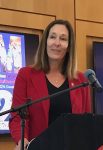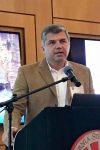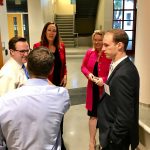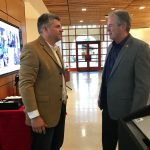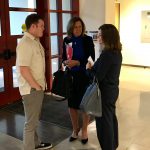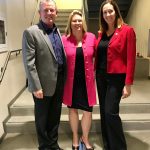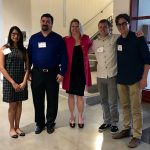Category: Technology
Interview at KZSB “Money Talk” on AI
KZSB radio interview from Monday May 15, 2023, on AI/ML, and especially ChatGPT. Link to Apple Podcast.
KVTA 1590 interview on Cloud and AI
May 8, 2023, with Tom Spence, on KVTA 1590
The podcast of the entire KVTA Morning Show with Spence can be found here and my presentation starts 3hrs and 38min into the show (3:38).
My talk in AWS series on remote learning
I am delighted to be participating in an AWS Webinar Series on Remote Learning.
From the page: During this unprecedented time of temporary and sustained school closings, educators across the globe are quickly transitioning to remote learning. This webinar series is designed by educators for educators and based on educator input from a recent survey capturing current challenges. Any educator is invited to join. There’s no cost for participating. The webinar topics are detailed below with links to sign up.
My talk is: Teaching Online: Ten Suggestions for Success
As you shift from traditional instruction to online instruction, learn from Dr. Michael Soltys the things you should consider and actions you should to take for a successful transition. Don’t think of this move to online teaching as a one-off. Think of it as an opportunity to build an online offering that can serve your department and students for years.
Registration is free an open to everyone: https://register.gotowebinar.com/rt/1904846026857359373
Cybersecurity event @CSUCI on April 20, 2018
On the evening of April 20, 2018 Assemblymember Jacqui Irwin and CSU Channel Islands president Erica D. Beck co-hosted a Cybersecurity event in Sierra Hall, promoting regional industry partnerships. At this event we had the opportunity to showcase our work – three masters students and one senior student presented research under my supervision:
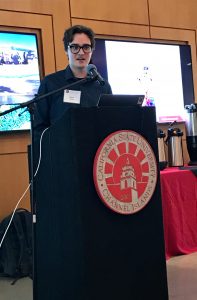 Zane Gittins spoke about his network penetration testing at HAAS: this work started as a Hank Lacayo Internship at HAAS in the fall of 2017, but since then Zane has been hired by HAAS to continue his work.
Zane Gittins spoke about his network penetration testing at HAAS: this work started as a Hank Lacayo Internship at HAAS in the fall of 2017, but since then Zane has been hired by HAAS to continue his work.
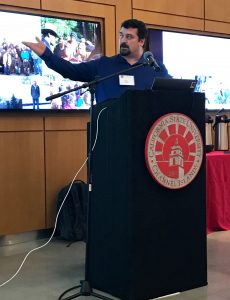 Eric Gentry spoke about the SEAKER project, a digital forensic tool that was developed with and for the High Technology Task Force (HTTF) at the Ventura forensic lab. We presented this tool at an event on August 7, 2017.
Eric Gentry spoke about the SEAKER project, a digital forensic tool that was developed with and for the High Technology Task Force (HTTF) at the Ventura forensic lab. We presented this tool at an event on August 7, 2017.
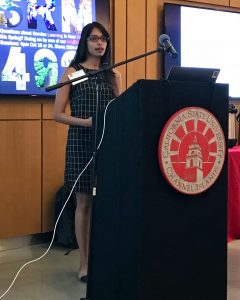 Geetanjali Agarwal spoke about the Image Recognition project, also inspired by the work done at the HTTF at the Ventura lab, where we aim to identify images from partially recovered files and compare them to a bank of images using the difference hash technique.
Geetanjali Agarwal spoke about the Image Recognition project, also inspired by the work done at the HTTF at the Ventura lab, where we aim to identify images from partially recovered files and compare them to a bank of images using the difference hash technique.
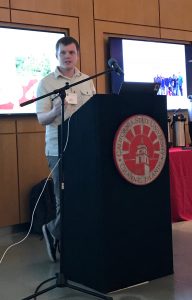 Ryan McIntyre presented his work on algorithms in bio-informatics. These results have been published recently in the Journal of Discrete Algorithms, and described in a blog post on March 6, 2018.
Ryan McIntyre presented his work on algorithms in bio-informatics. These results have been published recently in the Journal of Discrete Algorithms, and described in a blog post on March 6, 2018.
Here are the presentation slides.
I introduced the students making some remarks elaborating on president Beck’s statement about partnerships between CI and the Ventura industry. As a CI faculty, I find interdependence in the triad of Scholarship, Teaching and Industry relations. Many of our projects start by addressing a Research & Development need of the community, such as the SEAKER tool for HTTF. We use it to teach our students a hands-on approach to problem solving in Computer Science; we aim to produce quality work that advances knowledge and is publishable.
Scholarship, the first component of the triad, is really composed of three simultaneous activities: the research itself, which is laborious, time consuming, consisting of literature review and the cycle of hypothesis, testing and proving.
The funding component: labs, equipment, salaries, conferences, all these require funds, which can be secured through grants, philanthropic gifts or state support.
And finally dissemination, which is crucial as without it no one is aware of our work, and which takes place through publishing, conference presentations, blog writing, and events such as the one described in this blog. At CI we are lucky in that Advancement facilitates both fundraising and dissemination.
Thanks to Assemblymember Jaqui Irwin @JacquiIrwin, as well as Professor Michael Soltys @MichaelMSoltys and his Computer Science students for their efforts in addressing Cybersecurity #csuci #camarillo #computerscience #cybersecurity pic.twitter.com/Rhrz85klfj
— Erika D. Beck (@CIPresBeck) April 21, 2018
SEAKER presentation at CI on August 7 at 6pm in DEL NORTE 1530
seaker
“Storage Evaluator And Knowledge Extraction Reader”
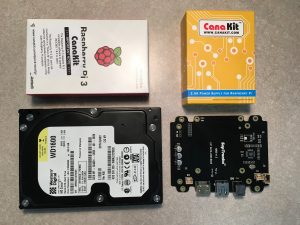
On Monday August 7, at 6pm, in DEL NORTE 1530, the COMP 524 (Cybersecurity) students will present their final project, a technical solution for the SoCal High Technology Task Force in Ventura. This project implements a digital forensic tool with strict performance requirements.
We used GitHub as the software repository, Dropbox Paper for the documentation Wiki, and AWS S3 for distribution of the production version of the software.
You are cordially invited to attend; the presentation will take about two hours, and there will be snacks (Short link to this post: https://wp.me/p7D4ee-FJ).
Dropbox updates
The file syncing service gets more collaboration tools, preview support for more file types and, for the iOS app, scanning capabilities: http://bit.ly/28TPzLR
WordPress 4.4 is here!
What doxxing is, and why it matters
The term “dox” also spelt “doxx”, and short for “[dropping] documents” first came into vogue as a verb around a decade ago, referring to malicious hackers’ habit of collecting personal and private information, including home addresses and national identity numbers. The data are often released publicly against a person’s wishes. It is a practice frowned upon by users of Reddit, a popular online forum, and many others.
via The Economist explains: What doxxing is, and why it matters | The Economist.
Microsoft’s Azure too expensive?
Azure positions Microsoft reasonably well to maintain its enterprise accounts. However, young Web-based companies generally do not use Microsoft products and services because they are too expensive. They prefer Linux and other free open source products, or hosting via Amazon, Google, and others. This preference does not bode well for Microsoft. The startup firms of today will become the larger customers of the future and, in general, they are not Microsoft customers.
via The Legacy of Steve Ballmer | January 2014 | Communications of the ACM.

